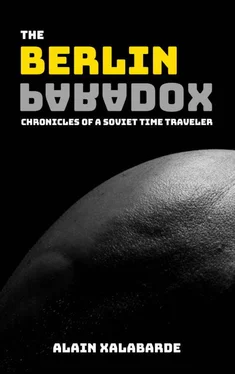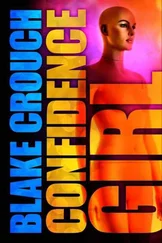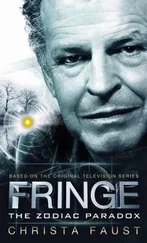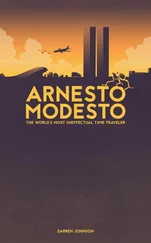She finally breaks eye contact, but keeps turning her head towards me as they both walk away.
I notice people around have been staring. I know it. But I ignore it. Keep your head down and your mind busy until the end of the show. Just forget it. Forget it.
The play sardonically puts me up to date with history. It’s a moving story of a girl separated by the wall. Her mother in the east, her father in the west. At some point they join her father in the west. Soon after, the wall comes down and, disappointed by the west, she moves back to the east. Huh.
The actors take a bow and the audience applauds. Knowing now what these people have gone through in the last few years changes the perception of the time I live in. This city is alien to me. I don’t know what to expect from it anymore. It’s like a childhood friend you meet after many years of being apart. Even though you were the closest of friends back then, you realize you know nothing of this person anymore. He looks like what you’d imagine he would look like, but it’s not him. Inside, he’s someone else entirely.
I exit the theater and find Burak waiting for me outside. The years have taken a toll on him. His skin is as wrinkled as a brown paper bag. His beard hasn’t been combed in weeks.
We walk towards his car. I feel like I should be making small talk, but I’m not very good at that. He keeps to himself. I can tell he is thinking of a million other things. We arrive to his car. He’s bought a new once since we last met. Whatever it is he is doing now, business must be going well for him. The car is a red Volkswagen. I don’t pay much attention to the model. It’s looks quite ugly, to be honest, but once I sit inside I find it quite comfortable.
We drive down to Kreuzberg and he quickly finds a parking spot. The neighbourhood has changed a lot since I last saw it.
It seems he still lives in the same apartment block. We walk up the stairs and he opens the door. This time the house is much tidier. There are no boxes. It is also quieter. There is nobody waiting to greet us. He walks me to a different room from the last time. It’s very old-fashioned compared to the rest of the apartment, which is mostly covered with posters of music bands and movies I’ve never heard of. On the night table is a picture of, I’m guessing, Burak’s mother. She looks very elegant, and a ray of sunlight makes the back of her head glow. I’d like to ask about her, but I choose not to.
I sit on the bed and he soon brings me a set of clothes and a towel. He asks me if I’m hungry and leaves before I am able to answer. I get up and grab the clothes. I open the wardrobe. It is full of women’s dresses. They are all very conservative and it smells damp inside, as if they haven’t been worn in a while. I decide to close it and leave my clothes on a chair.
I join Burak in the kitchen. He is making a sandwich. No. Scratch that. He is putting a pack of salami, cheese and a loaf of bread on the table. I begin making my own sandwich and wonder if he should be eating salami in the first place. He opens the fridge, brings out two cans of beer and places them on the table. I guess he’s more German and less Turkish than I assumed.
I ask him if we’ll be meeting with anyone. I’d like to say the girl’s name, but I still don’t know it.
He shakes his head. I ask what happened. I interrupt him as he is about to answer and ask about ‘the female scientist’ (that’s how I choose to address her). He says she’s gone. My heart twists inside my chest. He says she moved with her husband to Austria, or maybe it was Switzerland. After the wall fell, the Russians cut all the funding. They paid him enough to keep track of any future visits (like this one). I ask him how many trips I have left. He answers that he was told not to give out that sort of information.
I ask him what the plan is. He opens his mouth and the doorbell rings. His reaction tells me that he wasn’t expecting anyone tonight. He gets up and walks to the foyer. I hear him opening the door. He shouts with dread and I jump to my feet. I run to the foyer and I find a woman holding a toddler by the hand and carrying a baby in her arms. Burak shakes his head, but she insists fervently. Burak yells something in Turkish and points in my direction. The woman is startled when she sees me. She keeps silent for a moment and bows her head slightly, embarrassed. A moment later however, she gently pushes the toddler inside the house and hands Burak the baby. Burak complains, but the woman, who I’m guessing is his ex-wife, sticks a finger in his face and threatens him. Burak takes a deep breath and shakes his head. The woman kisses both her children and storms down the stairs.
Burak closes the door and turns to me. He apologizes. Explains himself with an elaborate story that sounds too messy to follow. The toddler runs towards me and punches me in the leg. Burak scolds him in Turkish and a second later the baby begins to cry.
I stand in front of the Reichstag. It is early morning but there is no one around. I can only hear the wind. The sky is grey and unsettled. Scattered columns of black smoke rise high up into the air around the city. Something buzzes right past my ear, like some sort of oversized wasp. It makes the hair on the back of my neck stand. I turn around and find an army of soviet soldiers running towards me from across the field. They all have my father’s face. Another bullet buzzes right by my ear. I duck instinctively. A landmine explodes and rips the body of one of the soldiers into chunks of meat. I turn back to the Reichstag and find a swarm of German soldiers shooting machine guns against the soviet troops. I run for cover and jump into a ditch. More than a ditch, it’s the crater left by a mortar. I peek my head above the hole and look closely at the German soldiers. They all, too, have my father’s face. Someone taps me on the shoulder. I turn around. I find a child staring right at me. He holds out his hand. He has a live grenade inside of his minuscule fist. I rapidly reach out to grab it but it explodes in our face.
I wake up in Burak’s mother’s bed. Drenched in sweat. I breathe in hard. My mouth is dry. I feel a tiny hand tapping my shoulder. I shake underneath the sheets and turn my head. Burak’s toddler is staring at me. His dark eyes sparkle in the darkness of the night. He holds out his hand. He opens his fist, but there’s nothing inside of it. I don’t understand what he’s asking for. He babbles and hops on the spot. He pokes his grandma’s picture on the night table. The picture frame rocks back and forth, struggling to keep up straight. The toddler finally turns around and runs out the room.
I reach out and grab the picture frame and make the wobbling stop. My heart is still racing. My mind has nothing to fear, but my body thinks otherwise. I try to lay back down and cover myself with the sheets. I stare at the doorway, waiting for someone to show up at any second, but no one comes. My eyelids drop slowly as I slowly fall back asleep. Just before my eyes are fully shut, I think I see the shadow of a person entering the door frame, but it’s too late. My brain has switched off and I fall back into deep sleep.
* * *
Burak woke me up quite early in the morning. I think his kids wouldn’t let him sleep and he didn’t want to take the burden alone. I offered to make breakfast while he entertained the children. It’s only now, when I reach the kitchen, that I realize I can’t cook. I make some coffee, prepare a couple bowls of cereal and bring a carton of milk. Seems to be sufficient for Burak. The bags under his eyes say he’s too tired to ask for more.
An hour later I decide to go out for a walk. The high-pitched screaming and running is getting under my skin. Burak understands and simply asks me not to go too far. I nod, but I don’t follow his advice.
Читать дальше











